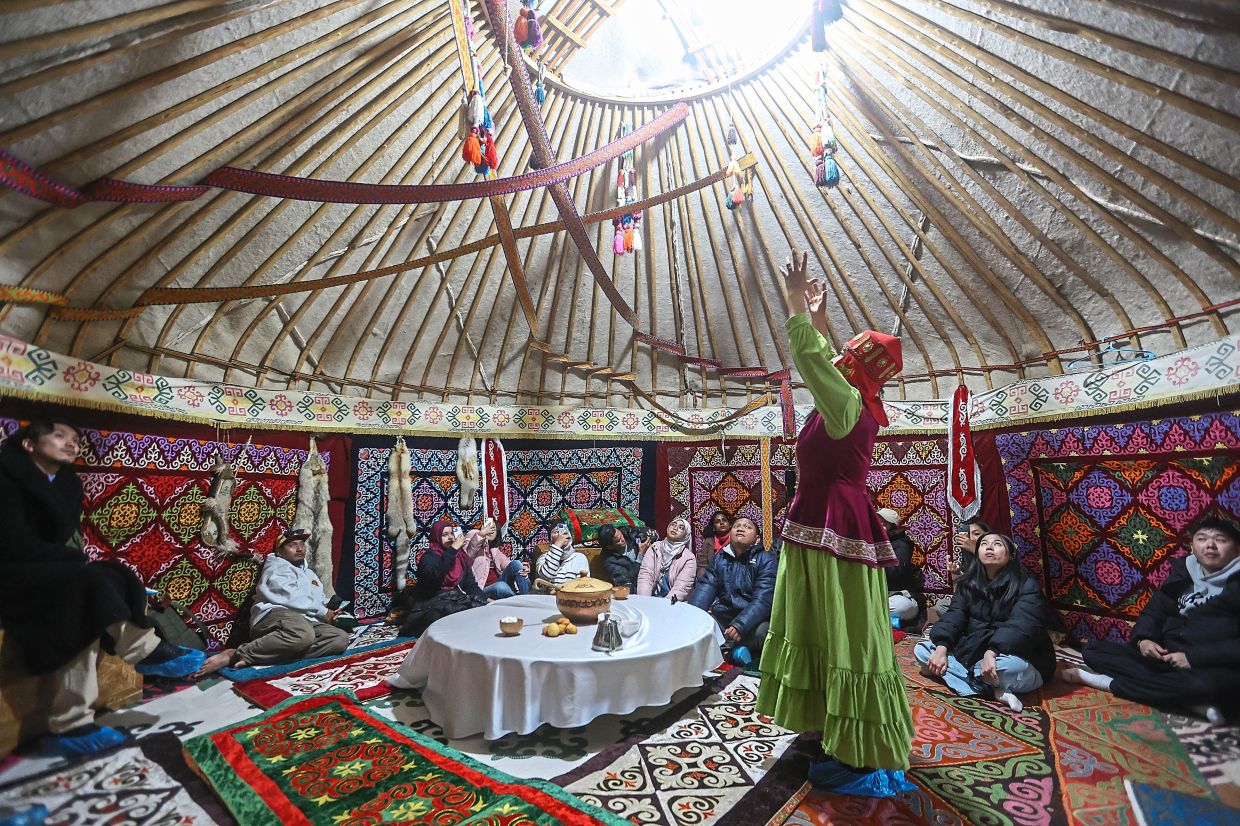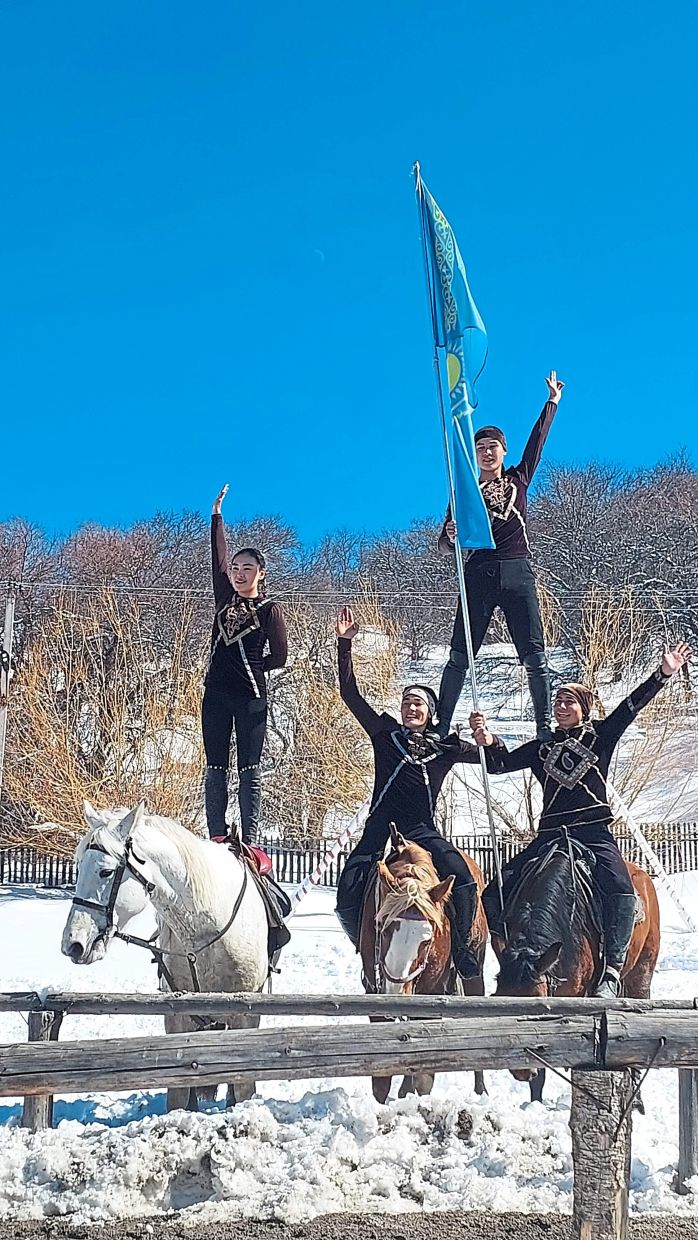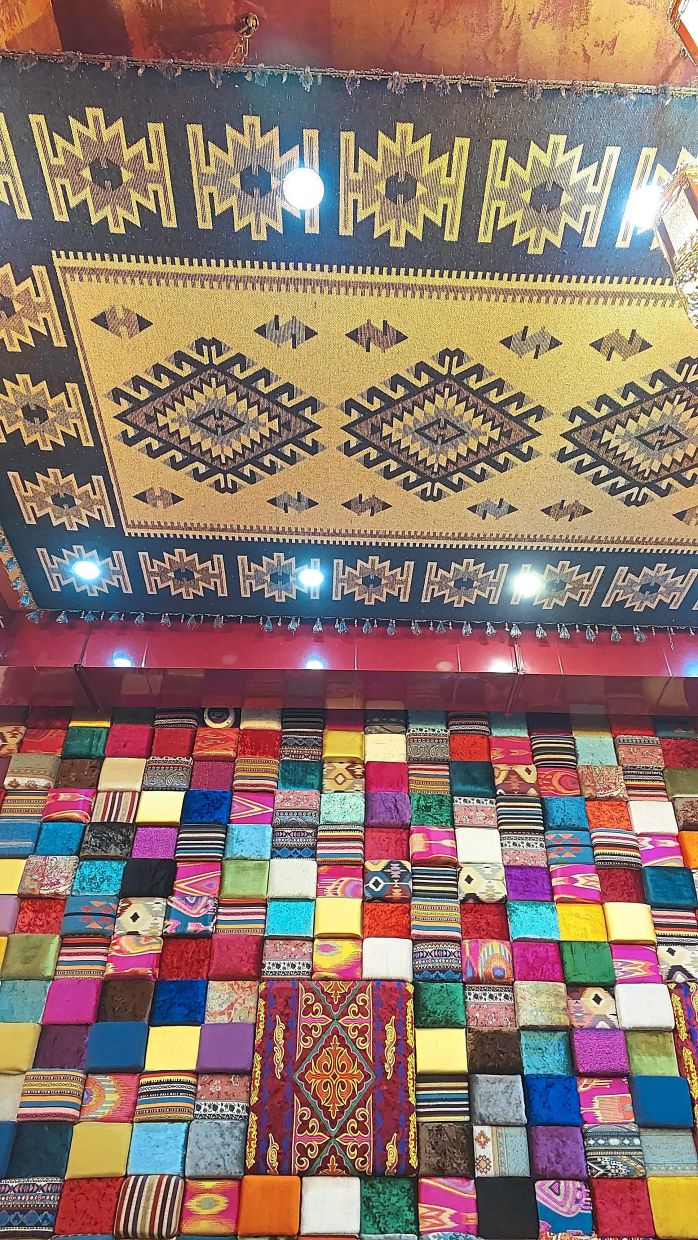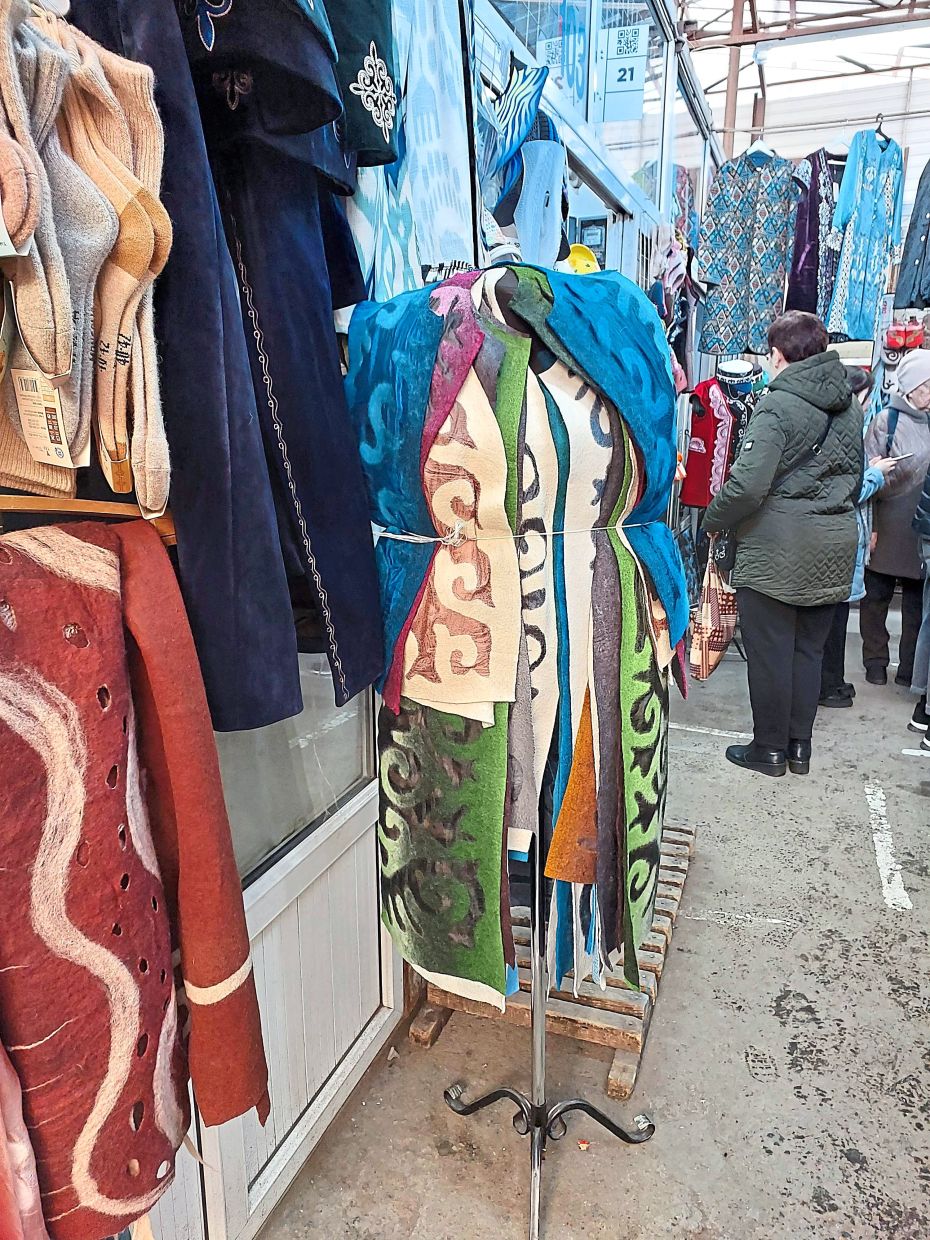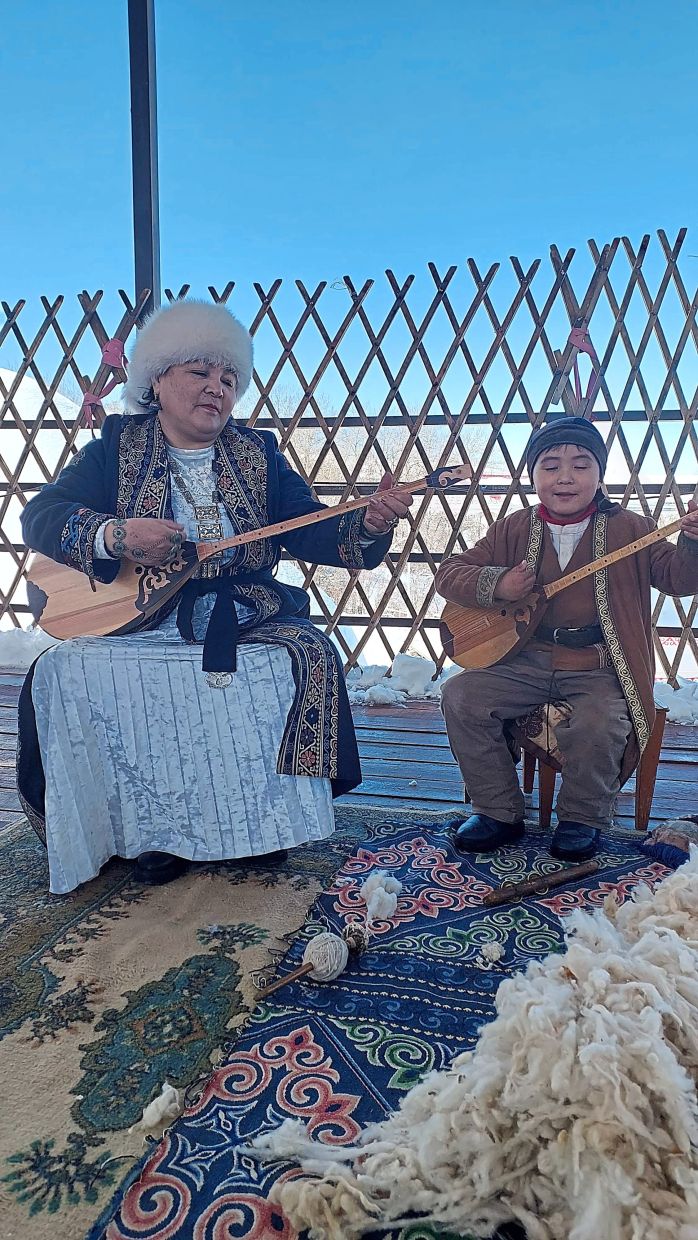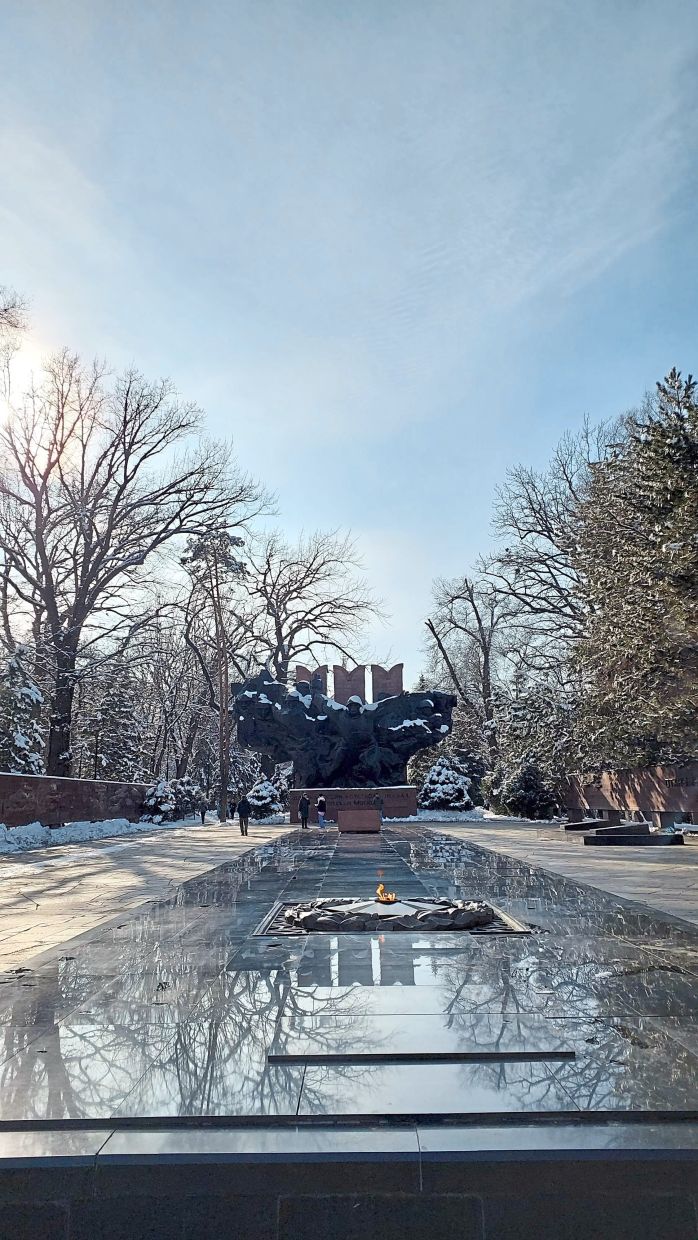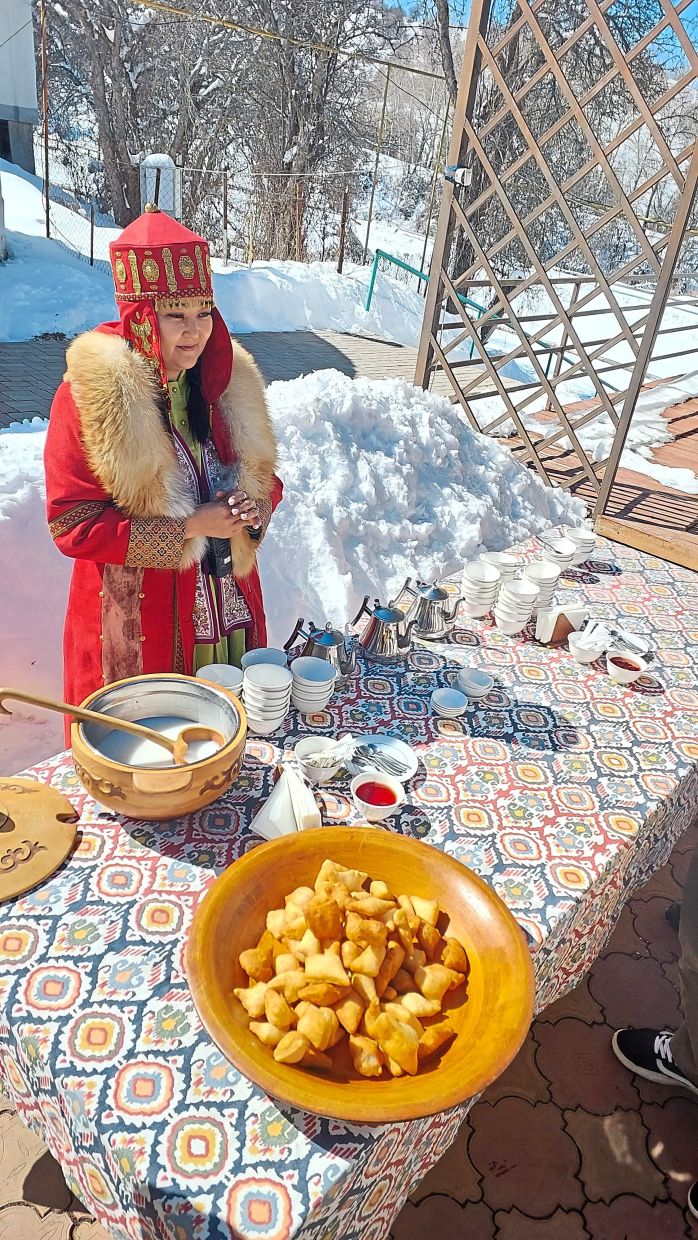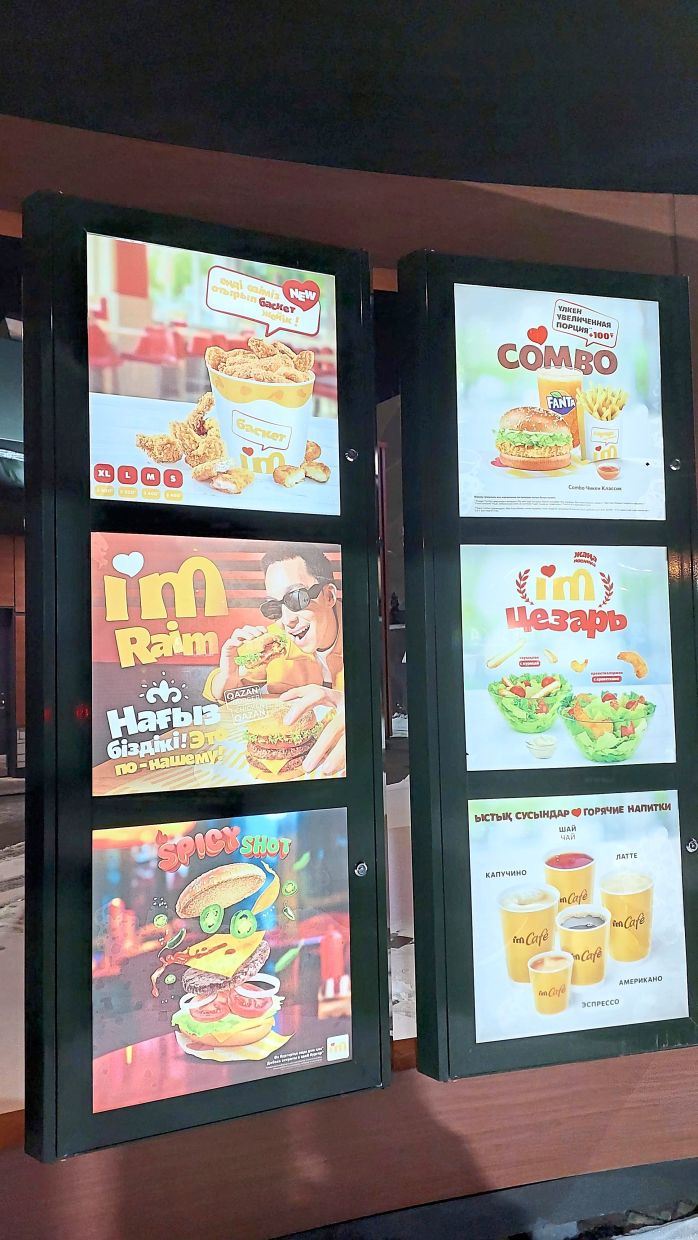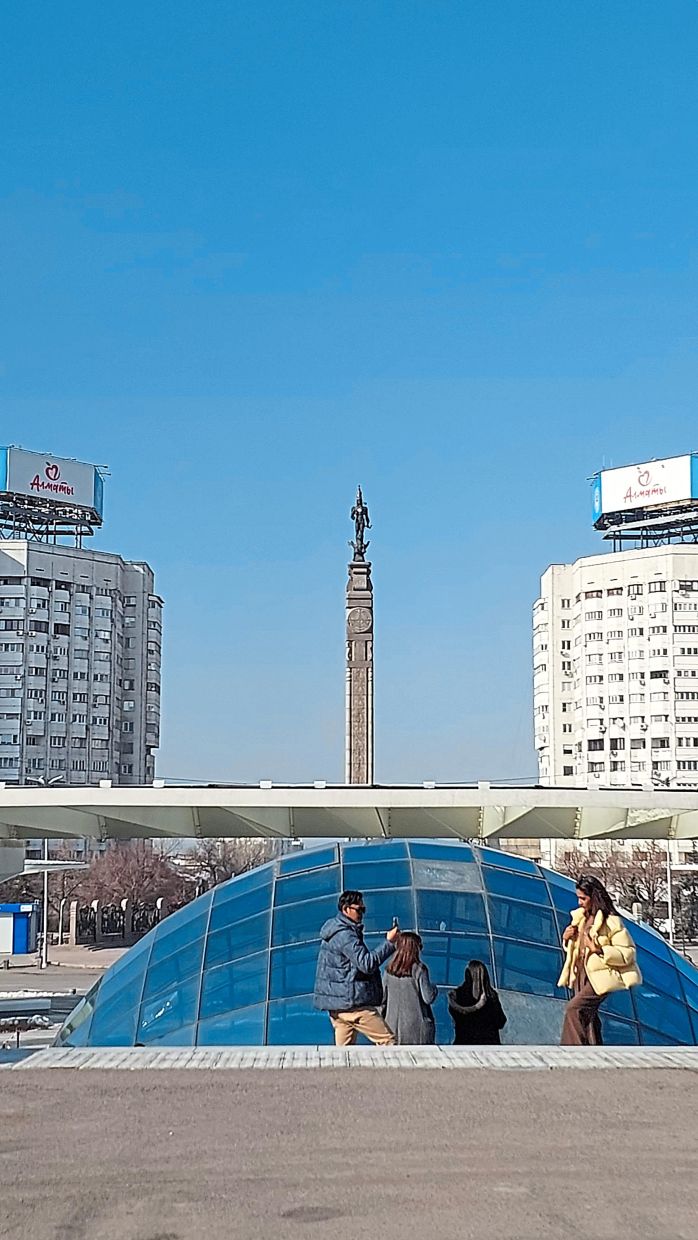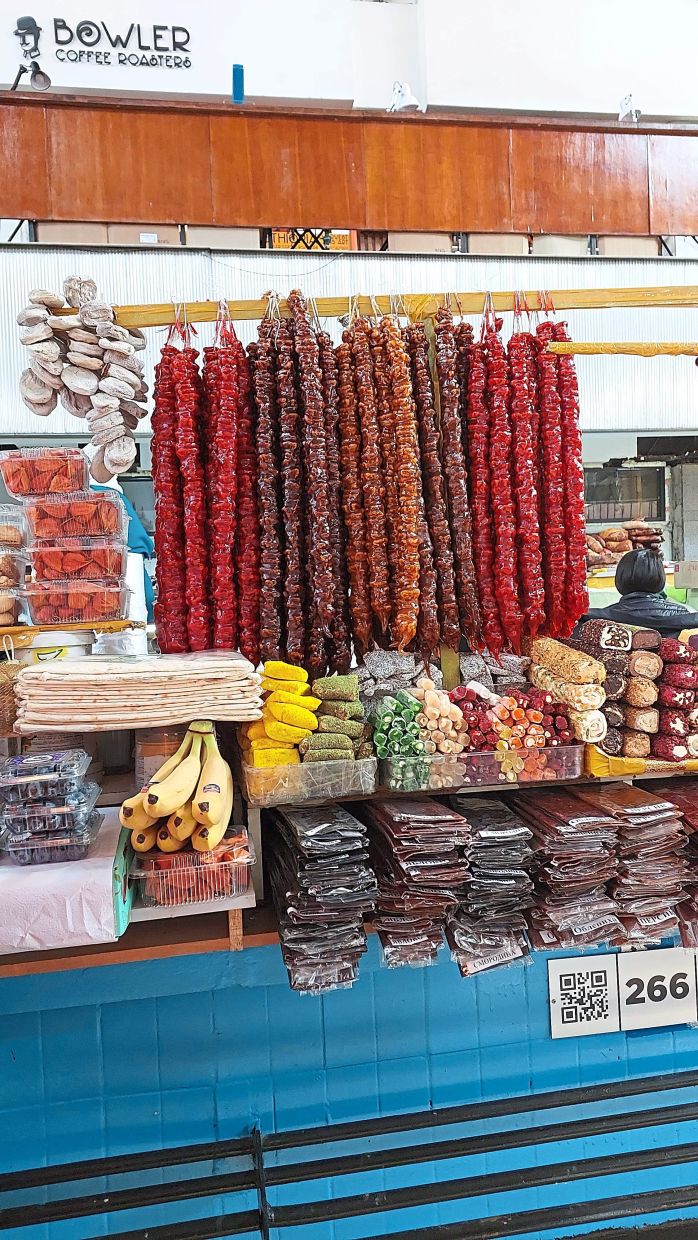In 2016, the first ever McDonald’s outlet in Kazakhstan was opened in the capital, Astana. The businessman who owned the local franchise – one of the richest men in the region, Kairat Boranbayev – then swiftly opened about two dozen outlets across the country, and business was booming.
However, in January 2023, McDonald’s Corp announced that it would be leaving Kazakhstan, which then prompted the closure of all the outlets there. The company cited a severe supply chain issue, caused by the Russia-Ukraine war that had erupted months prior.
But just a short few weeks after the closure of the international fast food chain’s last outlet in Kazakhstan, the restaurants reopened with signboards reading “My Otkryty” (“we are open” in Kazakh). The food was said to be very similar to what a McDonald’s would typically serve, with some minor tweaks.
Today, these restaurants are known as I’M, with the apostrophe stylised as a heart.
We came across one outlet near Atakent Mall in Almaty recently, where a group of us were visiting for a few days, courtesy of AirAsia and in conjunction with AirAsia X’s inaugural flight to Kazakhstan, its first foray into Central Asia.
While our tour leader, Islam A. Moustafa of Skyway, shared the general story of I’M mentioned above, it was his friend, Damir, who revealed another interesting take on the issue.
According to him, when Kazakhstan’s second president Kassym-Jomart Tokayev came into power in 2019, many things in the country started to change – for the better.
“Corrupt or unscrupulous leaders and others were investigated and then either fired, fined or sentenced to prison. Boranbayev was one of those who were caught. That’s probably one of the unofficial reasons why McDonald’s shut down here too,” said Damir, who joined us for dinner one night at a swanky restaurant called Noodles.
Kazakhstan’s ancient history is fascinating, but its modern history is a little complicated (but no less interesting), and even more so when you get the down low from young locals like Damir and Islam, who are in their 20s.
Kazakhstan was once part of the USSR, and its diplomatic ties to Russia remains friendly to this day. Since its independence from the Soviet Union in 1991, Kazakhstan has only ever had two presidents; the first, Nursultan Nazarbayev, was in power for nearly 30 years, stepping down only in 2019. He had left a legacy that was far from impressive, said to be full of cronyism and corruption.
The country saw many major changes in the past few years, progressing even before the new president came into power.
“But he (Nursultan) was a corrupt man with many corrupt followers, so whatever money the country made did not translate into a better life for all the people of Kazakhstan – only to a select few,” shared Damir, a tour guide who specialises in music tourism (he takes local tourists to music concerts and festivals abroad).
He added that although the current president is still “fairly new”, the fact that his policies seem to improve the country’s economy shows some hope of a better future.
“But we shall see how it goes,” he said.
Almaty is the largest city in Kazakhstan – itself the ninth largest country in the world – and its cultural, financial and commercial hub. It is also the most developed and populous city, with about two million people, made up of mainly Kazakhs and Russians, as well as Ukrainians, Uyghurs, Tatars and even Koreans.
Almaty was once the country’s capital too; the previous government moved the capital to Astana in 1997. Astana is a 90-minute flight away from Almaty and is said to be, according to the locals, “kinda boring”.
“It’s where the administrative buildings are, so the people there are more ... formal. It’s nicer here in Almaty,” said Damir.
He may be biased but he isn’t wrong about Almaty. While Astana does have its charms, Almaty is like the prettier, more approachable sister whom everyone fawns over. It is where local folks and tourists from neighbouring countries go to for a short holiday.
It truly is a nice tourist destination with lots of natural attractions like the perpetually turquoise Big Almaty Lake, the Charyn Canyon, and of course, the commanding Trans-Ili Alatau or Zailiisky Alatau mountain range, which is visible from almost everywhere in the city.
Unfortunately for us, we weren’t able to visit the lake or canyon as we did not have enough time to do so. Plus it had snowed heavily on the day we arrived, so the road conditions weren’t really ideal for long drives.
“It’s already spring; most of us had already stored our thick winter clothing. Then you guys came and it started snowing again,” said Islam, half-jokingly.
Snow and horseplay
To be honest, the frosty weather and snow made the city look very pretty, and most of us in the group enjoyed our post-dinner walks around the neighbourhood in the cool, crisp air. Something we probably don’t do much of in warm, tropical Malaysia.
But an unexpected hike (the ground was too slippery for the cars to drive up or down the hill) during our excursion to the Huns Ethno Village, a living museum showcasing the lifestyles and traditions of the Kazakh nomads, was not as pleasant.
Who knew you could sweat so much in sub-zero temperatures? I certainly didn’t!
At the entrance of the village two young men sitting on well-behaved horses were patiently waiting for us. Once everyone arrived, a lady – the village’s tourism manager Moldakanova Aigerim – in traditional Kazakh costume opened the gate and started throwing sweets at us.
“This is shashu, our tradition of throwing sweets to guests to bring good luck and prosperity. The more sweets you collect, the better your luck,” she said.
So there we were, scrambling for sweets on the wet, icy ground. I wondered what the horses thought of us then.
The village tour consisted of several parts, namely a cooking demonstration, an arts and craft display which included an impromptu music session, a horse show, and a casual chat in a yurt, the traditional abode of the nomads. (Historically, the Huns were a nomadic group of people living within Central Asia, hence the name of the village.)
Visitors get to try their hand at making baursak, a Kazakh fried dough snack similar to the Chinese yau char kway or you tiao, and drink kumiss, which is fermented horse (from the mare, of course) milk.
I had a sip of kumiss the night before and was not fond of it because I couldn’t get past its ... “horsiness”. Due to the fermentation, kumiss tastes sour but has a slightly bitter aftertaste, or at least that’s what I experienced. The milk is fermented as a way to pasteurise it, so that the nomads can store it for a longer period, without the aid of a refrigerator.
I may not drink kumiss ever again, but I would still recommend every visitor to Kazakhstan try a sip. Horse milk is said to have lots of nutrition, and if you’ve ever seen a Kazakh before, you would probably be keen to follow their diet, fermented horse milk and all.
In the cosy yurt, we learnt about how the nomads live, both back in the day and in modern times. It is said that there are still some Kazakhs who lead nomadic lifestyles today, tending to their livestock from one region to the other every few months.
“You must always enter a yurt with your right foot first, and do not step on this (points to the threshold of the door). A woman’s things are kept on the left side while a man’s things are placed on the right,” said Aigerim. She talked about a few other yurt “rules” and showed us some olden household items and furniture, which included a bassinet.
Historically, the nomads are known to be great horsemen so we were treated to an exciting show featuring some young riders doing stunts and tricks on their horses. There was also some dancing, which visitors were invited to join.
According to Aigerim, the village welcomed over 16,000 tourists last year, and she expects to see about 20,000 visitors this year.
Park life
Almaty’s city centre itself is not short of attractions. Start with the Panfilov Park, where you will find a large statue (and several smaller ones around the area) dedicated to the 28 soldiers of an Almaty infantry unit who stopped Nazi tanks from entering a village near Moscow during World War II in 1941. There is also an eternal flame lit in front of the statue.
Further down the park is the pale yellow Ascension Cathedral or Zenkov Cathedral, a Russian Orthodox church originally built in 1907. Visitors are allowed in, but you can’t take photographs as it is a functioning cathedral and worshippers are often seen praying in the halls.
On another corner, you will find the Kazakh Museum Of Folk Musical Instruments, housed in a wooden building that was built in 1908. As the name suggests, there are collections of traditional Kazakh instruments on display here including the two-stringed dombra (a kind of lute), the kobyz (violin) and wooden harps. Some Turkish, Uzbek and Kyrgyz instruments are also kept here.
Republic Square, meanwhile, is a place where local families go to on weekends. It is a large space surrounded by a handful of landmark buildings and monuments, one of which is the Independence Monument. Bronze sculptures and statues depicting the country’s history and background can be found here.
Also known as the New Square, the area is commonly used as a public events space.
Make your way up to the Kok Tobe hill via a cable car. This tourist attraction is situated about 1,100m above sea level, and is also a favourite spot among locals, especially in spring and summer.
You can find a mini zoo, an upside-down house, a Ferris wheel and a mini theme park on Kok Tobe, but if there is snow, most of these sections will be closed. Tip: Remember to take a panoramic shot of the city from this place, especially if you’re there just in time for sunset.
Want to go higher? Head to Shymbulak (2,200m), the largest ski resort in Central Asia that’s located about an hour from the city centre. There are several levels to this resort, and you would have to take different cable cars to get to each one.
This resort is only opened during winter, when the mountains are covered in thick snow, making it perfect for skiing and snowboarding. But visitors can also just hang around at Shymbulak as there are lots of cafes and restaurants at each level.
The only deterrent here is the low, low temperatures and the wind. “The higher you go, the lower the temperature. It is said that with each level you ascend here, the temperature drops one degree,” said Islam.
On the day we went, it went down to -9C°, and we did not even go right to the top!
Playing tourists
If you’re up for some shopping, skip the fancy malls and head to the Green Bazaar and Rakhat Chocolate Factory, where you should buy a duffel-bagful of Kazakhstan’s best chocolate. The dark chocolate – easily identified by its blue wrapper, although there are “touristy” versions with decorative wrappers – is not only exquisite, it is also affordable.
You can’t get it anywhere else outside of Kazakhstan, or if you do, you’d have to pay a whole lot more for it.
The Green Bazaar is just a short walk away from Rakhat, and is pretty much where locals get their produce, household items, basic clothing and other wares. For tourists, there is a section that sells souvenirs, but if you were to venture on your own here, be wary of where you are. Much like the famous Thai marketplace Chatuchak in Bangkok, you can easily get lost in the maze of shops and stalls if you don’t pay attention to your whereabouts.
Even our trusty guide Islam had some trouble finding his bearings. “I buy my groceries online so I don’t come here often!” he said, defending himself.
Best buys at the bazaar: All kinds of nuts but the pecan was especially delicious, candied fruits, nougats, textile products like scarves and shawls with traditional Kazakh patterns, ornamental dolls made from sheep wool, and of course, tea.
“We really love our tea and drink a whole lot of it at any time of the day,” said Islam. Except for bubble tea, it seems.
Do note that most stalls at the bazaar only accept cash.
There’s also a section that’s dedicated to horse meat, which is not a delicacy in Kazakhstan. In fact, beshbarmak, Kazakhstan’s national dish, consists of either boiled horse meat or lamb (sometimes beef) with potatoes or noodles, and served with onions.
“We eat lots of meat. It helps warm us up a lot during winter,” Islam shared, adding that horse meat is a healthier option than beef or lamb as it very lean. Other Kazakh staples include bread, grains like oats and rice, and root vegetables.
Almaty is also famous for apples. In fact, Almaty in Kazakh means “father of apples”, alluding to the fact that the city is where apples had originated from. The Malus sieversii is said to be a wild apple that was only found in Almaty thousands of years ago, and it was from this species that other varieties of apple were born across the globe.
Today, Kazakhstan’s top apple variety is the Aport.
Almaty is also a safe city to be in – save for the occasional earthquakes which Islam says, “It’s fine, don’t worry” – perfect for small groups and solo travellers. However, you may encounter a language barrier as English is not widely spoken in the country, although it is taught in schools.
Since 1989, the official language has been Kazakh, but Russian is an official language too. Most signs are written in both the Kazakh and Russian Cyrillic script, while tourist attractions and most public amenities have signs in English.
If you do plan to visit, consider getting a tour guide so as not to waste precious time trying to figure out how to communicate with the locals, or how to use public transportation like the bus and subway.
“Taxis are pretty cheap here so that’s always a better option if you’re travelling alone. But do try the Metro (subway), too, or at least go check out the stations because they’re very nice,” Damir suggested.
Sadly, we didn’t get to do this, but a quick search online showed some cool stations decorated with gorgeous murals, sculptures and other artworks.
This, for me, is just one of the reasons why a second visit to Almaty is already in the works.
Travel notes
How to get there: AirAsia X flies direct from Kuala Lumpur to Almaty four times weekly, on Tuesday, Thursday, Saturday and Sunday. The flights from Almaty are on the same days. The journey is about seven hours and 40 minutes.
Where to stay: There are many established hotels and resorts in the city, as well as other types of accommodation like hostels, bed-and-breakfasts and home-sharing rentals.
Currency and price: Kazakh tenge (KZT) is the official currency, with RM1 equivalent to 94.3KZT. To make conversions easier, just round things up (RM1 = 100KZT). For reference, a bar of Rakhat chocolate is 690KZT (less than RM7), while a combo meal at I’M costs between 1,950KZT (about RM19) and 3,250KZT (about RM32).
> For more photos, check out the Media Gallery.









